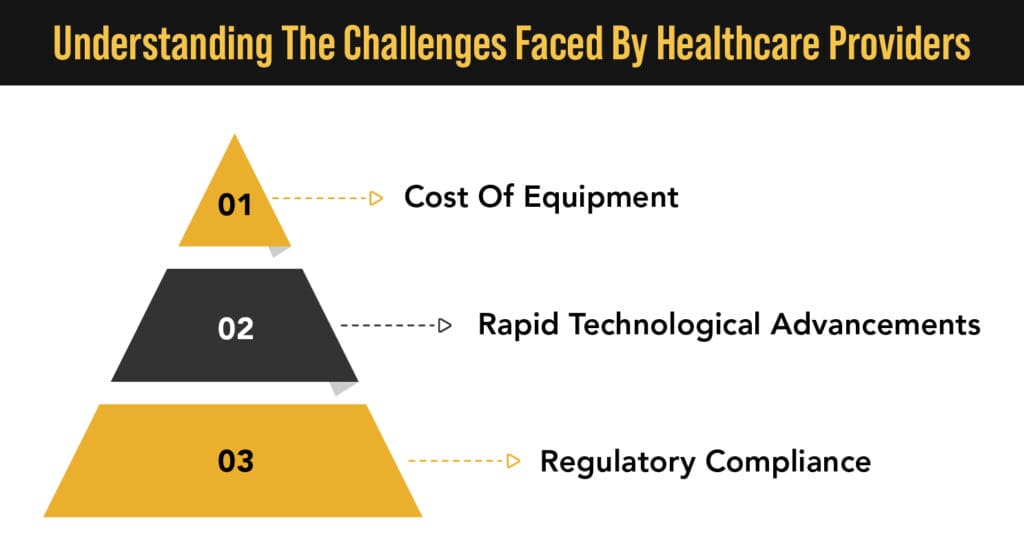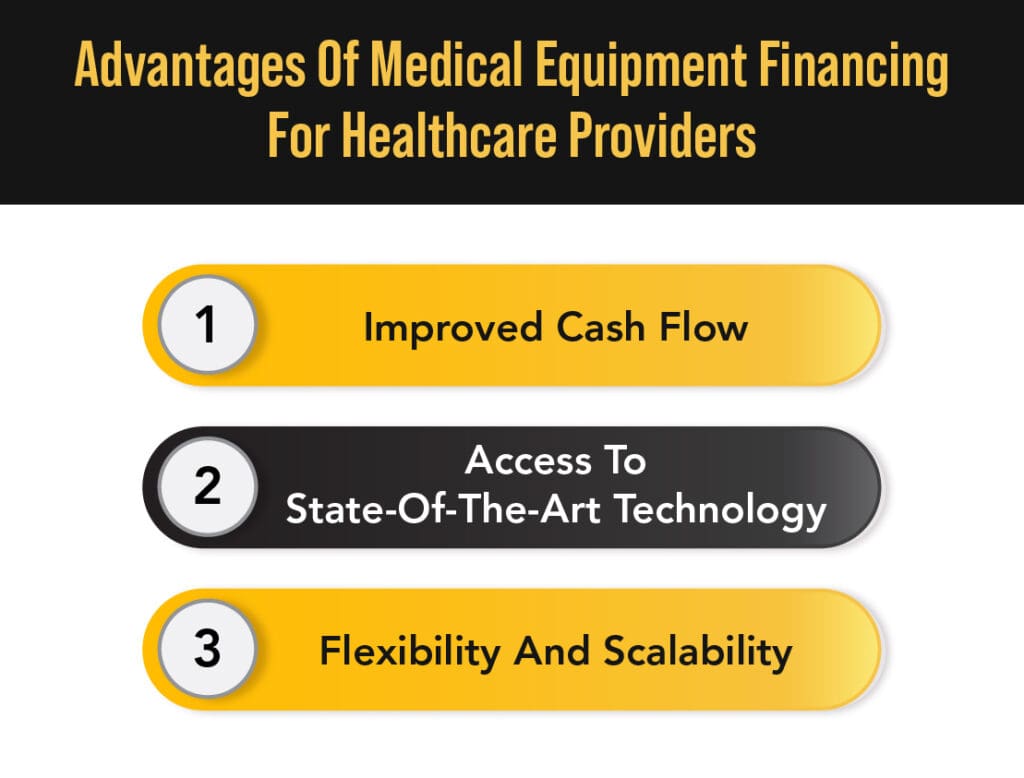Hey there, healthcare heroes! Ready to dive into the world of medical practice financing? Whether you’re dreaming of expanding your clinic, snagging the latest high-tech equipment, or simply keeping the lights on, understanding your financing options is crucial. Let’s break it down in a way that’s as smooth as your bedside manner.
The Financial Pulse of Medical Practices
Running a medical practice isn’t just about patient care—it’s also about managing the business side of things. From startup costs to daily operations, the financial demands can be hefty. Here’s a snapshot:
- Startup Costs: Launching a new practice can require an initial investment of $70,000 or more. This covers property expenses, renovations, recruitment, initial salaries, equipment, and more.
- Operational Expenses: Annual operating expenses can exceed $1.1 million, depending on the practice’s size.
- Equipment Upgrades: Staying current with medical advancements means regularly updating equipment, which can be a significant financial burden.
- Expansion Plans: Growing your practice to serve more patients or offer new services often requires substantial capital.

Why Medical Practice Financing Matters
Operating a medical practice isn’t cheap. Between hiring staff, managing patient care, maintaining compliance, and purchasing medical equipment, the costs can add up quickly. Medical practice financing ensures that healthcare professionals can focus on what truly matters—delivering exceptional patient care—without financial constraints holding them back.
Key Reasons Healthcare Professionals Need Financing
- Starting a New Practice– Setting up a new medical office requires substantial initial investment, including leasing a space, hiring staff, and purchasing medical equipment.
- Expanding Services– As patient demand grows, clinics may need additional space, technology, or specialized equipment.
- Purchasing Medical Equipment– High-end medical equipment like MRI machines, X-ray scanners, ultrasound machines, and dental chairs can cost anywhere from thousands to millions of dollars.
- Managing Cash Flow– Covering day-to-day expenses like payroll, utilities, rent, and supplies can be challenging, especially for newly established practices.
- Covering Unexpected Costs– Emergencies happen! A sudden equipment breakdown, regulatory fine, or urgent maintenance issue can strain finances if there’s no contingency fund in place.

Types of Medical Practice Financing
There’s no one-size-fits-all financing solution, which is why different loan options are available to healthcare professionals. Here are the most common types:
1. Term Loans for Medical Practices
A term loan is a lump sum of money provided upfront, which is repaid over a fixed period with interest. It’s commonly used for long-term investments like practice expansion, renovations, or purchasing costly equipment.
Pros:
- Fixed repayment schedule makes it easier to manage budgeting.
- Suitable for large, one-time expenses.
- Can be secured or unsecured, depending on creditworthiness.
Cons:
- May require collateral (e.g., medical equipment or real estate).
- Can have higher interest rates if the borrower has a lower credit score.
2. SBA Loans for Healthcare Professionals
The Small Business Administration (SBA) offers low-interest loans to eligible businesses, including medical practices. SBA loans often come with longer repayment terms and lower interest rates compared to traditional bank loans.

Pros:
- Lower interest rates and longer repayment terms.
- Flexible use of funds (can be used for working capital, equipment, or expansion).
- Partial backing by the government makes them less risky for lenders.
Cons:
- Stringent eligibility requirements.
- Long approval process (can take several weeks or months).
- Requires extensive documentation.
3. Business Lines of Credit
A business line of credit offers flexibility, allowing practices to borrow only what they need and repay the balance over time. This type of financing is best suited for covering operational expenses and handling cash flow fluctuations.
Pros:
- You only pay interest on the amount used.
- Quick access to funds for unexpected expenses.
- No fixed monthly payments like traditional term loans.
Cons:
- Higher interest rates compared to term loans.
- May come with maintenance fees.
- Requires good credit history for approval.
4. Equipment Financing for Medical Practices
Equipment financing is designed specifically for purchasing medical equipment. The loan is secured by the equipment itself, which means no additional collateral is needed.
Pros:
- Easier approval process since the equipment serves as collateral.
- Helps practices stay up-to-date with the latest medical technology.
- Lower upfront costs and predictable monthly payments.
Cons:
- Can be costly if equipment becomes outdatedbefore the loan is fully repaid.
- Funds are restrictedto equipment purchases only.
5. Working Capital Loans for Small Medical Practices
Working capital loans help healthcare professionals cover day-to-day expenses such as rent, payroll, utilities, and supplies. These loans are short-term solutions rather than long-term investments.
Pros:
- Quick access to cash for daily operational needs.
- No collateral required in most cases.
- Helps bridge the gap between billing cycles.
Cons:
- Short repayment terms, often within 12-24 months.
- Higher interest rates due to the short-term nature.
6. Medical Practice Business Loans for Startups
For new healthcare entrepreneurs, startup business loans can provide funding to get things off the ground. These loans help with:
- Leasing office space
- Purchasing initial equipment
- Marketing and branding
- Hiring employees
Since startups lack a financial track record, lenders may require:
- A solid business plan
- A high personal credit score
- Personal collateralsuch as real estate or savings
How to Qualify for Medical Practice Loans
Lenders look at several factors when considering an application for medical practice financing. Here’s what you’ll need:
1. Credit Score Requirements
- A credit score of 680+will get you better loan terms.
- Lower credit scores may still qualify but could require higher interest rates or collateral.
2. Business Plan
- A clear outline of how the funds will be usedand the projected revenueof the practice.
- Having a strong financial projectionincreases the chances of approval.
3. Financial Statements
- Lenders typically ask for tax returns, bank statements, and profit & loss statementsto assess financial stability.
4. Collateral (If Needed)
- Some lenders require collateralin the form of real estate, equipment, or personal assets.
How to Choose the Right Lender for Your Medical Practice
Not all lenders are created equal. When searching for financing, consider these factors:
1. Interest Rates & Fees
- Compare interest rates across different lenders.
- Watch out for hidden fees like origination fees, processing fees, or prepayment penalties.
2. Loan Terms
- Longer loan terms mean lower monthly payments but higher total interest paid.
- Shorter loan terms may save money on interest but require larger payments.
3. Lender’s Reputation
- Read customer reviews and testimonialsto ensure you’re working with a trusted lender.
4. Speed of Funding
- Some lenders provide funding within days, while others take weeks or months.
Why Consider Medical Practice Loans?
You might be wondering, “Do I really need a loan?” Let’s explore the benefits:
- Preserve Cash Flow: Financing allows you to spread out large expenses, keeping your cash flow healthy for daily operations.
- Stay Competitive: Access to funds means you can invest in the latest technology and services, keeping your practice at the forefront of patient care.
- Manage Growth: Loans provide the capital needed to expand your practice, whether that’s through new locations or additional services.
Types of Medical Practice Loans
Not all loans are created equal. Here’s a rundown of the options tailored for healthcare professionals:
1. Term Loans
A lump sum provided upfront, which you repay over a set period with interest. Ideal for significant investments like purchasing equipment or renovating your practice.
Pros:
- Fixed repayment schedule.
- Predictable budgeting.
Cons:
- May require collateral.
- Approval can be stringent.
2. Business Lines of Credit
Think of it as a financial safety net. You get access to a set amount of funds and only pay interest on what you use. Perfect for managing cash flow fluctuations or unexpected expenses.
Pros:
- Flexibility to draw funds as needed.
- Pay interest only on the amount used.
Cons:
- Variable interest rates.
- Potential fees for inactivity or maintenance.
3. Equipment Financing
Specifically designed to purchase medical equipment. The equipment itself often serves as collateral, making this a less risky option.
Pros:
- Preserves other credit lines.
- Often easier approval process.
Cons:
- Restricted to equipment purchases.
- Equipment may become obsolete before the loan is repaid.
4. SBA Loans
Backed by the Small Business Administration, these loans offer favorable terms but come with a rigorous application process.
Pros:
- Lower interest rates.
- Longer repayment terms.
Cons:
- Lengthy approval process.
- Extensive documentation required.
How to Qualify for a Medical Practice Loan
Lenders look at several factors when considering your application:
- Credit Score: A higher score increases your chances of approval and better terms.
- Business Plan: A solid plan demonstrates your strategy for success and repayment.
- Financial Statements: Up-to-date records show your practice’s financial health.
- Collateral: Assets that can secure the loan may be required, depending on the loan type.
Choosing the Right Lender
Not all lenders are the same. Consider the following when making your choice:
- Specialization: Some lenders specialize in healthcare financing, offering tailored solutions.
- Reputation: Research lender reviews and testimonials.
- Terms and Rates: Compare offers to find the best fit for your practice’s needs.
The Application Process
Ready to apply? Here’s a general roadmap:
- Gather Documentation: Financial statements, tax returns, business plan, and any other required documents.
- Complete the Application: Ensure all information is accurate and complete.
- Await Approval: This can range from a few days to several weeks, depending on the lender and loan type.
- Review Terms: Carefully examine the loan agreement before signing.
- Receive Funds: Once approved, funds are typically disbursed promptly.
Final Thoughts
Securing the right financing can be a game-changer for your medical practice. It empowers you to enhance patient care, expand your services, and stay ahead in the ever-evolving healthcare landscape. Remember, it’s not just about getting a loan—it’s about finding the right financial partner to support your vision.
Ready to Elevate Your Practice?
At VIP Capital Funding, we specialize in providing working capital loans for small businesses like yours. With over a decade of experience, we offer private/alternative lending, SBA loans, and business credit lines to fuel your practice’s growth. Let’s give your business the unique competitive advantage it deserves. Apply for a small business loan!


